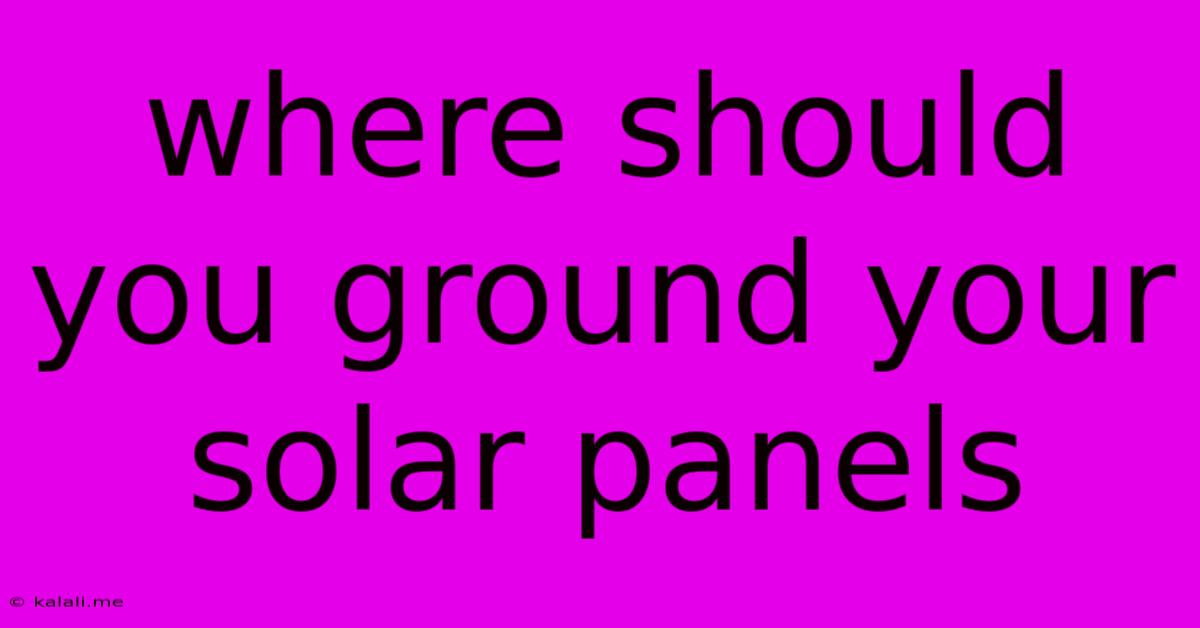Where Should You Ground Your Solar Panels
Kalali
Jun 07, 2025 · 4 min read

Table of Contents
Where Should You Ground Your Solar Panels? A Comprehensive Guide to Safe Installation
Grounding your solar panel system is crucial for safety and performance. A properly grounded system protects against electrical shocks, prevents damage from lightning strikes, and ensures the longevity of your equipment. This guide will explore the best practices for grounding your solar panels, covering various scenarios and considerations. Understanding these factors will help ensure your solar investment is both efficient and safe.
Why is Grounding Solar Panels Important?
Grounding your solar panels creates a path for stray electrical currents to safely flow into the earth. This is vital for several reasons:
- Electrical Shock Protection: Without proper grounding, a fault in the system could lead to dangerous voltage levels on the panels' metal frames, posing a serious risk of electric shock.
- Lightning Protection: Lightning strikes are a significant threat to any electrical system. A well-grounded system provides a low-resistance path for lightning currents to dissipate into the earth, minimizing damage to the panels and other components.
- System Stability: Grounding improves the overall stability of your solar panel system, preventing voltage surges and ensuring consistent performance.
- Equipment Longevity: Preventing electrical surges and stray currents through proper grounding extends the lifespan of your solar panels and other equipment, maximizing your return on investment.
Where to Ground Your Solar Panels: Key Considerations
The ideal grounding point for your solar panel system depends on several factors:
- Building Code Requirements: Local building codes dictate specific grounding requirements for solar installations. Always consult your local authorities and electricians to ensure compliance. This is especially vital since variations exist between regions and nations. Ignoring local codes can lead to fines and insurance complications.
- Ground Rod Installation: A dedicated ground rod is typically the best grounding point. This involves driving a copper-clad steel rod deep into the earth, ensuring a reliable connection to the ground. The depth and type of rod depend on soil conditions and local regulations. The use of grounding wire with appropriate gauge is also important.
- Existing Grounding Systems: If your house already has a robust grounding system, it might be possible to connect your solar panel system to it. However, this should only be done by a qualified electrician who can assess the existing system's capacity and ensure a safe connection.
- Panel Mounting System: The type of mounting system used will influence the grounding method. For example, roof-mounted systems may require grounding the mounting rails, while ground-mounted systems may utilize the ground itself as a grounding point.
- Distance from the Inverter: The grounding point should ideally be close to the inverter and the main panel. Minimizing the length of the grounding wire reduces the risk of voltage drop and resistance.
Grounding Methods and Best Practices
Several grounding methods exist; the appropriate method depends on the specific installation. Always consult a licensed electrician for installation and inspection. They possess the expertise to determine the correct procedures and ensure your system's safety and compliance.
- Grounding rods: The most common approach is using dedicated ground rods driven into the earth. Multiple rods may be necessary for optimal grounding in high-resistance soil.
- Metal Building Structures: If your panels are mounted on a metal building, the building's grounding system can be utilized, provided it meets the required standards.
- Water Pipes: In older structures, water pipes may have been used as a ground path; however, modern building codes discourage this due to the potential for corrosion and variations in pipe materials.
- Connecting to the Main Electrical Ground: Connecting to your house's main ground is usually permitted but needs careful consideration and proper execution by a certified electrician to avoid introducing potential problems to the house’s electrical system.
Maintaining Your Grounding System
Regular inspection of your grounding system is vital to ensure its ongoing effectiveness. Look for signs of corrosion, damage, or loose connections. Addressing any issues promptly will help maintain the safety and efficiency of your solar panel system.
By carefully considering these factors and employing proper grounding techniques, you can ensure the safety and longevity of your solar panel system, maximizing its energy production and minimizing potential risks. Remember, safety should always be the top priority when working with electrical systems. Always consult with qualified professionals for design and installation.
Latest Posts
Latest Posts
-
Do I Need A Thermal Expansion Tank With Well Water
Jun 08, 2025
-
Billy Dont Be A Hero Friends Reference
Jun 08, 2025
-
Bible Death Where Is Your Sting
Jun 08, 2025
-
Esp32 Board Not Showing Up In Explorer Windows 10
Jun 08, 2025
-
Best Way To Reheat A Burrito
Jun 08, 2025
Related Post
Thank you for visiting our website which covers about Where Should You Ground Your Solar Panels . We hope the information provided has been useful to you. Feel free to contact us if you have any questions or need further assistance. See you next time and don't miss to bookmark.